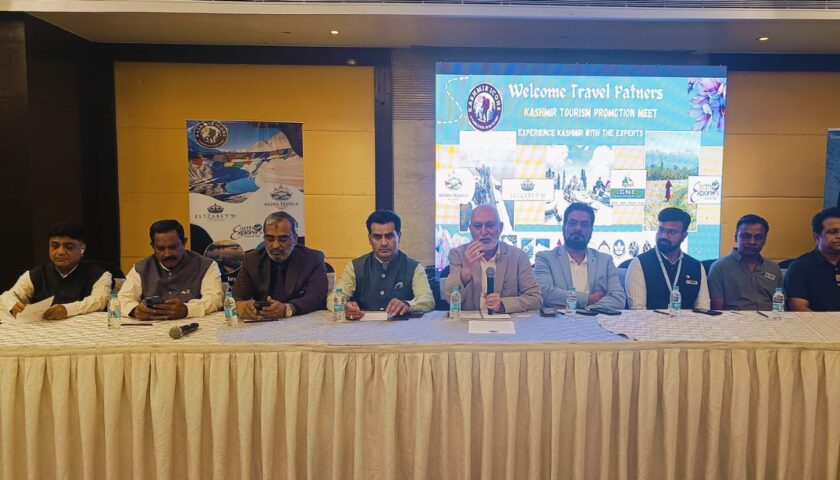Enough Is Enough: Kashmir’s Fruit Industry Bleeds While Leaders Trade Blame
By: Javid Amin | 15 September 2025
A Valley in Distress
The picturesque valleys of Kashmir, known for their lush orchards and vibrant mandis, are now echoing with frustration and despair. The NH-44 blockade, triggered by relentless rains and landslides, has paralyzed the movement of fruit-laden trucks, leaving apple growers, traders, and transporters in economic freefall.
While the crisis deepens, political leaders are locked in a jurisdictional blame game, and the people—especially those who depend on horticulture—are left stranded. This article dives deep into the crisis, its causes, the political response, and the urgent reforms needed to prevent future collapses.
Kashmir’s Fruit Industry—A Lifeline Under Siege
Kashmir’s horticulture sector contributes over ₹10,000 crore annually to the region’s economy. Apples, pears, plums, and cherries are not just commodities—they are the backbone of rural livelihoods.
But this year, the story is different. With NH-44 blocked for over two weeks, thousands of trucks carrying perishable produce are stranded. Mandis in Sopore, Shopian, Kulgam, and Anantnag have shut down. Growers report losses exceeding ₹500 crore, and the psychological toll is mounting.
“We’ve waited patiently, but now our fruit is rotting. We can’t afford this loss,” says Bashir Ahmad, a grower from Shopian.
The crisis is not just economic—it’s emotional. Families who rely on seasonal harvests are watching their year’s labor decay in silence.
NH-44 Blockade—A Recurring Nightmare
The Jammu–Srinagar National Highway (NH-44) is Kashmir’s primary supply artery. Every year, it faces closures due to landslides, subsidence, and adverse weather. But this year’s disruption is unprecedented.
- Heavy rains triggered multiple landslides
- NHIDCL failed to stabilize the highway despite early warnings
- Alternate routes like Mughal Road and Srinagar–Leh Highway proved unreliable
- Essential supplies, including fuel and medicine, were delayed
The result? A logistical collapse that has exposed the fragility of Kashmir’s infrastructure and the lack of contingency planning.
Omar Abdullah’s Statement—Frustration Meets Action
In a bold move, Chief Minister Omar Abdullah publicly criticized the Government of India’s handling of the highway crisis. His statement was clear:
“Enough is enough. If the Centre can’t manage the highway, hand it over to us.”
He also spoke directly to Union Minister Nitin Gadkari, urging the development of Mughal Road as a four-lane alternate highway. Abdullah emphasized that one train is not enough, and called for regular cargo services to rescue the fruit industry.
His intervention included:
- Personal visits to affected stretches
- Coordination with railway authorities to arrange fruit transport
- Assurance of concrete steps within 24 hours
While his efforts are commendable, critics argue that symbolic relief is not enough. The crisis demands systemic reform, not temporary fixes.
Political Blame Game—Mandis vs Highways
The crisis has also exposed a troubling jurisdictional tug-of-war. CM Omar Abdullah claims that fruit mandis fall under the UT’s domain, while the LG’s office insists that highways are the Union’s responsibility.
Caught in the middle are the growers, traders, and transporters—watching their produce rot while leaders debate accountability.
“The fight is political, but the loss is entirely ours,” says a trader from Sopore.
This blame game has eroded public trust and delayed meaningful action. It’s a reminder that governance must be collaborative, especially in times of crisis.
Shopian Gridlock—A Town in Standstill
The crisis reached a boiling point in Shopian, where fruit-laden trucks blocked roads, bringing public movement to a standstill. School buses couldn’t ferry children, and ambulances were delayed.
Local residents described the scene as chaotic and dangerous. The lack of traffic management and administrative response has raised serious concerns about disaster preparedness and urban planning.
Economic Fallout—Losses Beyond Numbers
The economic impact of the blockade is staggering:
- ₹500+ crore in fruit losses
- Transporters unpaid, facing fuel shortages
- Mandis deserted, traders in despair
- Bank loans defaulted, credit scores ruined
But beyond numbers, the crisis has triggered emotional trauma, especially among families who rely on seasonal harvests. The psychological toll of watching one’s labor rot is immeasurable.
Mughal Road—The Case for Alternate Connectivity
The Mughal Road, which connects Poonch to Shopian, has long been proposed as an alternate highway. But it remains underdeveloped, narrow, and seasonally unreliable.
CM Omar Abdullah’s plea to upgrade Mughal Road to a four-lane highway is not just political—it’s practical. Kashmir needs redundant infrastructure to survive future disruptions.
Benefits of Mughal Road development:
- Decongest NH-44
- Enable year-round connectivity
- Boost trade with Pir Panjal region
- Provide emergency relief routes
Leadership Accountability—Where Is the Horticulture Minister?
While the CM has been visible, Horticulture Minister Javid Dar has faced criticism for his absence. Growers report that he has not visited a single mandi since the crisis began.
This silence has sparked outrage among stakeholders, who feel abandoned and unheard. In times of crisis, visible leadership matters—not just for policy, but for morale.
What Needs to Change—Policy Recommendations
To prevent future collapses, Kashmir needs a multi-pronged strategy:
- Decentralize highway management for faster local response
- Upgrade Mughal Road as a permanent alternate route
- Establish cold chain logistics to preserve perishable produce
- Create emergency transport corridors for essential goods
- Mandate mandi inspections during peak harvest seasons
- Launch compensation schemes for growers and transporters
- Improve weather forecasting and disaster alerts
Final Word—Build for the Soil You Stand On
Kashmir’s fruit growers are not asking for charity—they’re asking for dignity, infrastructure, and accountability. The crisis is a wake-up call for leaders, planners, and citizens alike.
Because when the fruit rots, it’s not just the economy that suffers—it’s the soul of Kashmir.




